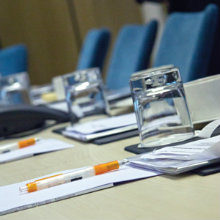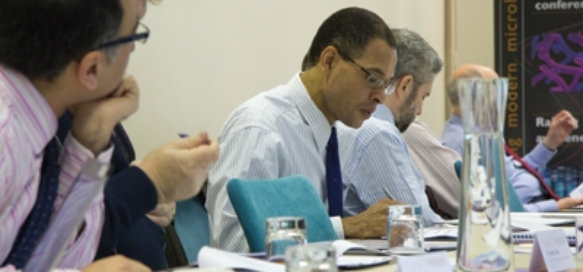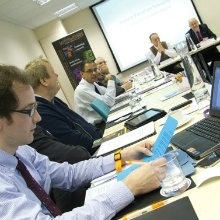Update on the Society’s work on sexually transmitted infections
Issue: Sexually transmitted infections (STIs)
21 May 2013 article

Sexual health – long-described as ‘The Cinderella of Medicine’ – risks missing out on the dramatic advances in basic scientific research that are now shaping other medical fields. This is the argument we plan to make in a forthcoming policy statement on sexually-transmitted infections (STIs), due for release later in the year.

WILLIAM BURNS
The statement is about research on STIs but it also applies to microbiological research on infectious diseases in general. Microbiologists should, rightly, have a leadership role in the infectious disease field. The statement seeks to reassert that leading role.
Why STIs are a policy priority
Following an extensive scoping exercise based around our policy priorities, the Microbiology Society Policy Committee, led by Professor Nigel Brown, decided that microbiological research on STIs needed the boost only a formal policy statement can give. We are still working on the content and welcome members’ views. The statement will likely focus on four major STIs: HIV/AIDS, chlamydia, gonorrhoea, and syphilis. HIV is a virus that destroys the immune system; the others are bacteria that can cause infertility, miscarriage, stillbirth and ectopic pregnancy.

Despite our best efforts to combat these infections by existing methods, new diagnoses have risen in the UK and internationally over the last decade. In the UK, we estimate that the numbers of people afflicted with these four infections are similar to those affected by cancer (around 300,000 people per annum). At the same time, antimicrobial resistance threatens to undermine treatments for gonorrhoea.
As we will point out to readers of the policy statement, microbiological research has been crucial in defining sexual health as a fixable scientific problem, rather than a moral failing. Pioneering bacteriologists discovered the infectious causes of gonorrhoea, syphilis and chlamydia and, as the historian John Lesch has eloquently shown, intensive chemotherapy research in the first half of the last century massively improved the treatment of bacterial STIs and infections in general. In the 1980s, studies conducted by microbiologists like Professor Robin Weiss, a former SGM President, helped demystify the HIV/AIDS epidemic in Britain at a time when this deadly disease caused understandable fear.
As microbiologists, we know that microbiology matters. It is a vibrant scientific discipline that plays a major role in solving practical problems in healthcare, the environment and industry, as well as responsibly pushing the frontier in areas such as synthetic biology. Unfortunately, not everyone knows this. This is why the Society, and many of our members, is making the case for microbiology among the broader academic community, policy-makers and politicians through initiatives such as the STI statement.

The work of the Expert Panel
To write the statement, we brought together an Expert Panel. The chair was Professor Peter Borriello, member, Editor-in-Chief of the Journal of Medical Microbiology, advocate for sexual health and a leading figure in the UK’s infectious disease policy, who has briefed government ministers.
Professor Borriello recruited panellists from the key microbiological disciplines (virology and bacteriology), public health doctors, civil servants in relevant departments, representatives from funding agencies and the sexual health charities, a sociologist and a historian of medicine. As the panellists pointed out, microbiology is inherently interdisciplinary, spanning from the very small (a viral particle or single bacterial cell) to the very large (epidemiology). It transcends short-, medium- and long-term agendas, from immediate practical uses to blue-skies research.
Over two fascinating day-long meetings held in rooms at Portland Place, London, the panel discussed the problems and challenges of sexual health policy and sought to identify key problems that could be solved through research. They then discussed how we could work together to bolster these priority areas. Microbiology was seen throughout to have a unique and important role as a bridge between the many disciplines contributing to future improvements in sexual health.
The statement
Reflecting discussion in the meetings, the statement will identify STI research priorities in four areas:
- Rapid diagnostics for antibiotic resistance
- New therapeutics, vaccines and microbicides
- Emerging threats
- Animal and ex vivo models for STIs
As we prepare the STI statement, we really welcome comments and advice from members as to focus, content and headline topics. Please get any contributions to us soon by emailing our Policy Officer: w.burns@microbiologysociety.org
How we are launching it
We will launch the statement later this year in the Houses of Parliament with the help of Dr Julian Huppert, a research scientist by profession who is also the MP for Cambridge. The launch event aims to draw together influential figures from the academic, policy, funder, health and charity sectors to ask them to back STI research.
The Microbiology Society walks the walk and talks the talk.
The launch event will kick off our own programme backing STI research, with the Society aiming to support members working in the field through various initiatives, such as a themed session at forthcoming scientific meetings. The critical role of members in steering this work, through the Policy Committee and the Expert Panel, draws attention to the importance of engaging with the Society and getting your voice heard. Members at all career stages are encouraged to apply to join the Policy Committee and engage with policy work in other ways
As a first step, why not find out what policy work could mean for you and how you can contribute? There isn’t a more important time to help strengthen our subject.
WILLIAM BURNS, SGM
Email [email protected]
Image: The Expert Panel, chaired by Professor Peter Borriello (above), meeting at Portland Place, London. Ian Atherton, Corbicula Design.
